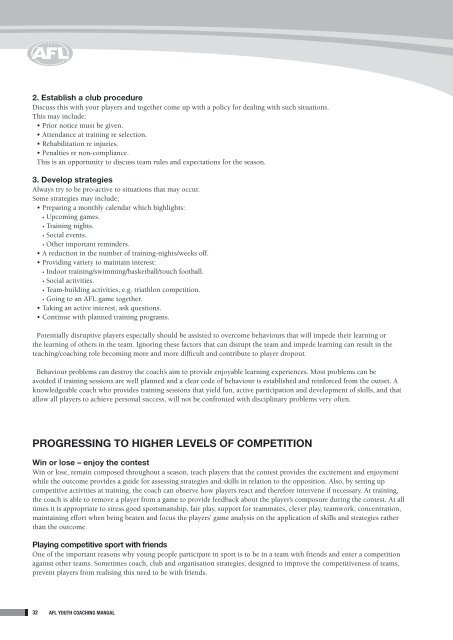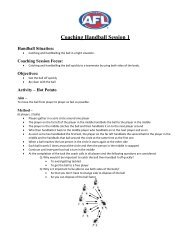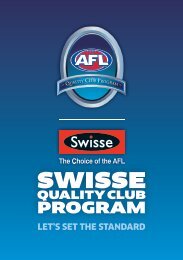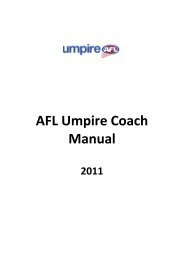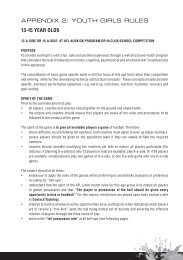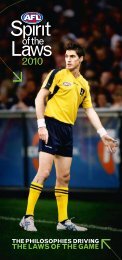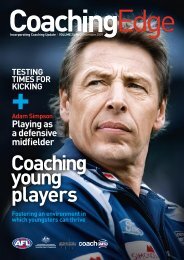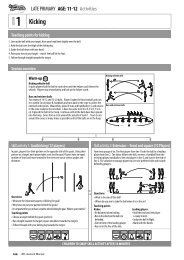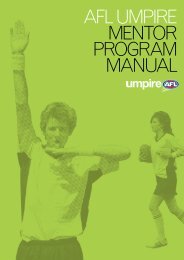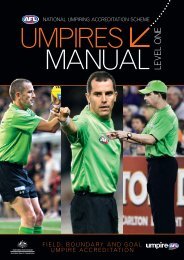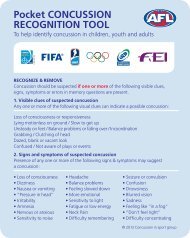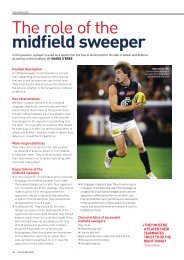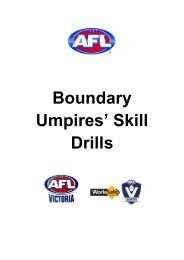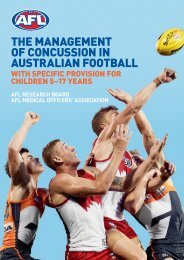2012 Youth Coaching Manual - AFL Community
2012 Youth Coaching Manual - AFL Community
2012 Youth Coaching Manual - AFL Community
Create successful ePaper yourself
Turn your PDF publications into a flip-book with our unique Google optimized e-Paper software.
2. Establish a club procedure<br />
Discuss this with your players and together come up with a policy for dealing with such situations.<br />
This may include:<br />
• Prior notice must be given.<br />
• Attendance at training re selection.<br />
• Rehabilitation re injuries.<br />
• Penalties re non-compliance.<br />
This is an opportunity to discuss team rules and expectations for the season.<br />
3. Develop strategies<br />
Always try to be pro-active to situations that may occur.<br />
Some strategies may include;<br />
• Preparing a monthly calendar which highlights:<br />
• Upcoming games.<br />
• Training nights.<br />
• Social events.<br />
• Other important reminders.<br />
• A reduction in the number of training-nights/weeks off.<br />
• Providing variety to maintain interest:<br />
• Indoor training/swimming/basketball/touch football.<br />
• Social activities.<br />
• Team-building activities, e.g. triathlon competition.<br />
• Going to an <strong>AFL</strong> game together.<br />
• Taking an active interest, ask questions.<br />
• Continue with planned training programs.<br />
Potentially disruptive players especially should be assisted to overcome behaviours that will impede their learning or<br />
the learning of others in the team. Ignoring these factors that can disrupt the team and impede learning can result in the<br />
teaching/coaching role becoming more and more difficult and contribute to player dropout.<br />
Behaviour problems can destroy the coach’s aim to provide enjoyable learning experiences. Most problems can be<br />
avoided if training sessions are well planned and a clear code of behaviour is established and reinforced from the outset. A<br />
knowledgeable coach who provides training sessions that yield fun, active participation and development of skills, and that<br />
allow all players to achieve personal success, will not be confronted with disciplinary problems very often.<br />
Progressing to higher levels of competition<br />
Win or lose – enjoy the contest<br />
Win or lose, remain composed throughout a season, teach players that the contest provides the excitement and enjoyment<br />
while the outcome provides a guide for assessing strategies and skills in relation to the opposition. Also, by setting up<br />
competitive activities at training, the coach can observe how players react and therefore intervene if necessary. At training,<br />
the coach is able to remove a player from a game to provide feedback about the player’s composure during the contest. At all<br />
times it is appropriate to stress good sportsmanship, fair play, support for teammates, clever play, teamwork, concentration,<br />
maintaining effort when being beaten and focus the players’ game analysis on the application of skills and strategies rather<br />
than the outcome.<br />
Playing competitive sport with friends<br />
One of the important reasons why young people participate in sport is to be in a team with friends and enter a competition<br />
against other teams. Sometimes coach, club and organisation strategies, designed to improve the competitiveness of teams,<br />
prevent players from realising this need to be with friends.<br />
32 <strong>AFL</strong> <strong>Youth</strong> <strong>Coaching</strong> <strong>Manual</strong>


